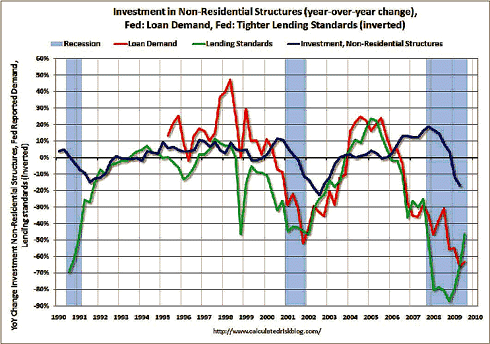Here are my Top 10 links from around the Internet at at 10am (yes really it's 10am today). I welcome any additions in the comments below or please send suggestions for Thursday's Top 10 at 10 to bernard.hickey@interest.co.nz I take being accused of being a Dilbert as a compliment...  1. The IMF's Chief Economist Olivier Blanchard has warned that the US and other governments need to wind back their fiscal stimulus packages soon or risk building up their debts so high that they destabilise their currencies, the FT reported. I still can't see how the US government and Federal Reserve can borrow and spend so much without triggering a collapse in the US dollar and/or worse. How long can they rely on that Reserve Currency status? It's a license to print money until we all lose confidence...
1. The IMF's Chief Economist Olivier Blanchard has warned that the US and other governments need to wind back their fiscal stimulus packages soon or risk building up their debts so high that they destabilise their currencies, the FT reported. I still can't see how the US government and Federal Reserve can borrow and spend so much without triggering a collapse in the US dollar and/or worse. How long can they rely on that Reserve Currency status? It's a license to print money until we all lose confidence...
Olivier Blanchard wrote that a rebound in US consumer confidence and increased US exports to surplus countries in Asia were needed to replace higher public spending.Without a pick-up in external demand to the US "“ "central to any world recovery" "“ the stimulus could be maintained too long, adding an undesirable amount to the country's debt burden, or choked off too soon, putting the recovery at risk. If fiscal deficits were maintained for too long, he wrote, there could be "worries about US government bonds and the dollar"¦ causing large capital flows from the United States. Dollar depreciation may take place, but in a disorderly fashion, leading to another episode of instability and high uncertainty, which could itself derail the recovery."
2. Germany's Economics Ministry is preparing for another credit crunch early next year, reports Ambrose Evans-Pritchard at The Telegraph. I worry that we're looking down the barrel of another ugly September and October, driven by banking crises in both continental Europe and the regional United States as banks that aren't too big to fail are allowed to fail.
"The most difficult phase for financing is going to be in the first and second quarter of 2010," said Hartmut Schauerte, the economic state secretary. "We are working as a government to create instruments that can offset a feared credit crunch or any credit squeeze in sectors of the economy," he said. Mr Schauerte said firms with weak balance sheets may struggle to roll over loans as they come due in coming months. Negotiations with banks could prove "very difficult". State support is likely to be concentrated on boosting the capital base of German firms and providing credit insurance for exporters, perhaps to the tune of €250bn to €300bn (£256bn). "If this service fails, we are going to see dozens of credit collapses," he said.
3. The problems in the relationship between China and Australia are mounting in the wake of the Rio Tinto argy bargy. Reuters reports that China has cancelled a senior ministerial visit to Australia. This could be a problem for us because Australia is our largest trading partner and has emerged relatively unscathed from the global economic crisis, largely because of China's enormous appetite for Australian minerals, coal and gas.
Beijing canceled a visit by Vice-Minister for Foreign Affairs He Yafei because Canberra granted a visa to exiled Uighur leader Rebiya Kadeer, blamed by China for instigating last month's ethnic riots in Xinjiang province. "Australia very much regrets that China has decided to effect that response," Australian Foreign Minister Stephen Smith told parliament on Tuesday. "We have a long-standing, productive economic relationship with China. From time to time in any bilateral relationship there will be difficulties. These difficulties need to be managed carefully and successfully, as Australia is currently managing difficulties that we currently have with China."
4. Here is some more evidence to suggest that the household debt burden will actually get worse before it gets better when there is no inflation and asset values fall. This applies to everyone, including us. Econompicdata has a nifty chart showing US household debt to net worth has actually risen because net worth is falling and the debt is only flat. The link to the chart is here as I can't embed it.
We take a look at household debt, net worth, and the subsequent household debt to net worth ratio (think of it as an analogy to a company's debt / equity ratio). What we've seen is a large decline in household net worth, but unfortunately we haven't seen a corresponding decline in household debt.
5. The Federal Reserve bought another US$7 billion of bonds on Monday night and now has only US$40 billion left in its locker to buy bonds out of the US$300 billion pool it started with, Rolfe Winkler at Reuters points out. This will mean the pressure will come on to push long term interest rates higher.
After today's $7 billion purchase, the Fed has just $40 billion left. Spread out over the next 10 weeks, that doesn't give it very much ammo. To date, purchases have averaged over $12 billion per week. That is set to fall to $4 billion. Anyway, you can see that the Fed will indeed be putting on the brakes. Assuming, of course, that Bernanke doesn't change his mind about stopping at $300 billion"¦.
6. Here is the real face of the recession/depression in the United States. City and county councils and state governments are now closing their offices for days at a time to save money. Many of these states and cities have balanced budget acts on their books and are simply stopping services to save money. This is a major offsetting factor to the first Obama stimulus package and makes America feel like it really is in a depression. Here is a useful Reuters story that talks about how this affecting life on the street.
Frank Giannola drove nearly 40 miles from Lockport, Illinois, to downtown Chicago on Monday, only to find city hall shuttered for the day. "This is the city that works?" he asked, mockingly referring to a Chicago motto. The subcontractor, who had taken the day off to obtain a sewer permit, joined a steady stream of residents, contractors and business people who came by car, taxi and on foot at midday looking for city services. They were greeted with a sign that city hall was closed for "a reduced service day" -- the first of three days this year Chicago will curtail services such as garbage pick-up, libraries and health clinics -- but not public safety -- to save $8.3 million. The saving is small compared with the $300 million revenue shortfall Chicago expects in its fiscal 2009 budget as the economic recession dramatically slows key tax generators.
7. Just in case you wonder how over valued the US stock market is right now, here's Henry Blodget and a chart that should make most people run for cover. Even a normalised chart shown in Henry's blog is sobering. Again, I reckon September and October could be real ugly. 

How's this for financial innovation? A group of artists in North Brooklyn is trying to develop a local Brooklyn currency -- the Brooklyn Torch -- that's meant to encourage locals to spend within the community, and boost local pride. Turns out, local currencies are not only legal, they already exist in places like Madison, Wisc. and Ithaca, NY. Since we no longer back up money with the gold, notes only have to be declared to be money by an authority. The U.S. dollar is backed by the U.S. government, and the Ithaca Hour is backed up by the Circulation Committee of Ithaca HOURS, Inc.
9. Bond market guru Bill Gross from Pimco lays out in his monthly newsletter how the American economy is fundamentally broken in a 'new normal'. This is consistent with a picture of a lost decade or two for the engine room of global growth. It's a long rambling read, but still worth it.
Common sense tells us that consumer spending growth comes from highly employed, well-compensated labor, and we are far-far from even approaching that elemental condition. The fact is that near double-digit unemployment has resulted from numerous business models that are now broken: autos, home construction, commercial real estate development, finance, and retail sales. Construction of a new Humpty Dumpty capitalistic "oeuf" will be a herculean task. A 3% nominal GDP "new normal" means lower profit growth, permanently higher unemployment, capped consumer spending growth rates and an increasing involvement of the government sector, which substantially changes the character of the American capitalistic model. High risk bonds, commercial real estate, and even lower quality municipal bonds may suffer more than cyclical defaults if not government supported. Stock P/Es will rest at lower historical norms, and higher stock prices will ultimately depend on tangible earnings growth in the form of increased dividends, not green shoots hope. An investor should remember that a journey to 3% nominal GDP means default/haircuts for assets on the upper end of the risk spectrum, as well as extremely low yielding returns for government and government-guaranteed assets at the bottom end.
10. US lending volumes and criteria continue to tighten despite all the government money pumped into the banking system. It is just being held on deposit with the Federal Reserve. Banks aren't lending, partly because the demand isn't there and partly because they are scared witless with an sh. Calculated Risk has a good report on the latest Federal Reserve Loan officers survey. Here's a full version of the chart on commercial real estate lending below. 
Of particular interest is the increase in tighter lending standards for Commercial Real Estate (CRE) loans. This graph compares investment in non-residential structure with the Fed's loan survey results for lending standards (inverted) and CRE loan demand. Note that any reading below zero for loan demand means less demand than the previous quarter. The slump in CRE investment is just getting started ...
11. (Bonus!) Mike Shedlock (Mish) from GlobalEconomicAnalysis also riffs on this theme about a lost decade Japanese style.
In the Incredible Shrinking Boomer Economy I noted a harsh reality quote of Bernanke: "It takes GDP growth of about 2.5 percent to keep the jobless rate constant. But the Fed expects growth of only about 1 percent in the last six months of the year. So that's not enough to bring down the unemployment rate." Pray tell what happens if GDP can't exceed 2.5% for a couple of years? What about a decade (or on and off for a decade)? If you have come to the conclusion that we are going to have structurally high unemployment for a decade, you have come to the right conclusion. Ask yourself: Is that what the stock market is priced for?

We welcome your comments below. If you are not already registered, please register to comment
Remember we welcome robust, respectful and insightful debate. We don't welcome abusive or defamatory comments and will de-register those repeatedly making such comments. Our current comment policy is here.